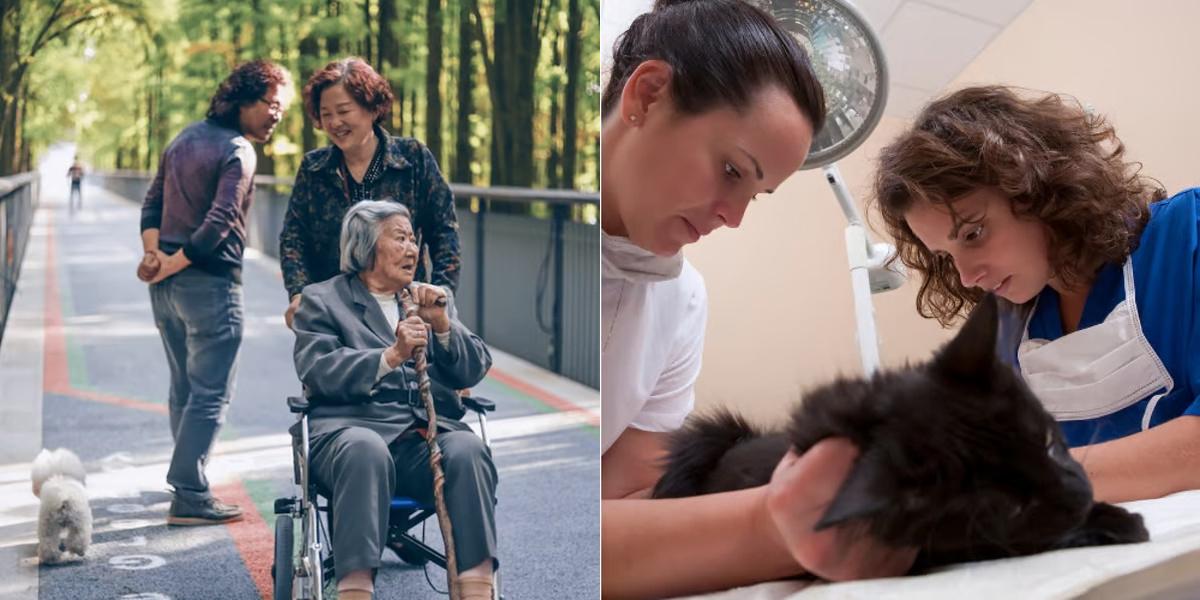Home Health Aide vs Veterinary Assistant

Want personalized recommendations?
Let's match you to the right program

Key Points:
- Home health aides provide personal care to clients at home, while veterinary assistants support veterinarians in animal hospitals.
- Home health aides typically earn less than veterinary assistants.
- Demand for home health aides is expected to grow faster than for veterinary assistants due to an aging population.
- Both jobs may require in-person training, but home health aide programs are often shorter and more accessible.
- Home health aide training is generally less expensive and shorter, around 75 hours, compared to veterinary assistant programs, which can take several months.
When it comes to choosing a career path, it's important to consider your interests, skills, and the job market. Two popular vocational training options are becoming a Home Health Aide and a Veterinary Assistant. Both of these careers involve providing care and assistance to others, but they differ in terms of the populations they serve and the skills required.
In this blog post, we will explore the roles and responsibilities of Home Health Aides and Veterinary Assistants, the differences between the two professions, and the education and training required for each. We will also discuss the career outlook and salary potential for both professions to help you make an informed decision about which path is right for you.
Article continues after recommendations
Recommended for you
What is a Home Health Aide and Veterinary Assistant?
Home Health Aide
A Home Health Aide is a healthcare professional who provides personal care and assistance to individuals who are unable to perform daily tasks on their own. They work primarily in clients' homes, but may also provide care in assisted living facilities or hospice settings. Home Health Aides help clients with activities of daily living (ADLs) such as bathing, dressing, grooming, and meal preparation. They may also assist with medication management and basic medical tasks under the supervision of a nurse or other healthcare professional.
Veterinary Assistant
A Veterinary Assistant is a healthcare professional who provides support and assistance to veterinarians and veterinary technicians in animal healthcare settings. They work primarily in veterinary clinics, animal hospitals, and animal shelters. Veterinary Assistants help with the care and treatment of animals by observing and monitoring their behavior, administering medications, preparing examination rooms, and assisting with procedures and surgeries. They may also provide basic grooming and nutrition advice to pet owners.
Difference between a Home Health Aide and Veterinary Assistant
While both Home Health Aides and Veterinary Assistants provide care and assistance to others, there are several key differences between the two professions:
Populations Served
- Home Health Aides primarily work with individuals who are elderly, disabled, or chronically ill. They provide care and assistance to help these individuals maintain their independence and quality of life in their own homes.
- Veterinary Assistants primarily work with animals. They provide care and assistance to sick or injured animals and support veterinarians in diagnosing and treating various conditions.
Work Environment
- Home Health Aides typically work in clients' homes, assisted living facilities, or hospice settings. They may travel between different locations to provide care.
- Veterinary Assistants typically work in veterinary clinics, animal hospitals, or animal shelters. They may work with a variety of animals, including cats, dogs, and small mammals.
Skills Required
- Home Health Aides need strong interpersonal and communication skills to effectively communicate with clients and their families. They also need basic medical knowledge and the ability to perform tasks such as taking vital signs and administering medications.
- Veterinary Assistants need a strong love for animals and the ability to handle them with care and compassion. They also need basic knowledge of animal behavior, anatomy, and common veterinary procedures.
Job Responsibilities
- Home Health Aides assist clients with activities of daily living (ADLs) such as bathing, dressing, and grooming. They may also help with meal preparation, medication management, and basic medical tasks.
- Veterinary Assistants assist veterinarians and veterinary technicians with animal care and treatment. They may help with administering medications, preparing examination rooms, and assisting with procedures and surgeries.
Home Health Aide vs Veterinary Assistant: Job Description
Home Health Aide
- Provide personal care and assistance to individuals who are unable to perform daily tasks on their own.
- Help with activities of daily living (ADLs) such as bathing, dressing, grooming, and meal preparation.
- Assist with medication management and basic medical tasks under the supervision of a nurse or other healthcare professional.
- Provide emotional support and companionship to clients.
Get courses selected just for you
Try our powerful search engine
Article continues after recommendations
More recommendations for you
Veterinary Assistant
- Provide support and assistance to veterinarians and veterinary technicians in animal healthcare settings.
- Help with the care and treatment of animals by observing and monitoring their behavior, administering medications, and preparing examination rooms.
- Assist with procedures and surgeries, such as taking X-rays or collecting laboratory samples.
- Provide basic grooming and nutrition advice to pet owners.
Home Health Aide vs Veterinary Assistant: Education and Training
Home Health Aide
- Most Home Health Aide programs require a high school diploma or equivalent.
- Formal training programs for Home Health Aides are available through vocational schools, community colleges, and healthcare organizations.
- Training programs typically include both classroom instruction and hands-on clinical experience.
- Some states require Home Health Aides to complete a certification program and pass a competency exam.
Veterinary Assistant
- Veterinary Assistant programs typically require a high school diploma or equivalent.
- Formal training programs for Veterinary Assistants are available through vocational schools, community colleges, and veterinary technology programs.
- Training programs typically include both classroom instruction and hands-on clinical experience.
- Some states offer certification programs for Veterinary Assistants, which may require passing an exam.
Home Health Aide vs Veterinary Assistant: Career Outlook and Salary
Home Health Aide
- According to the Bureau of Labor Statistics (BLS), the employment of Home Health Aides is projected to grow 34 percent from 2019 to 2029, much faster than the average for all occupations.
- The median annual wage for Home Health Aides was $26,440 in May 2020, according to the BLS.
Veterinary Assistant
- According to the BLS, the employment of Veterinary Assistants is projected to grow 16 percent from 2019 to 2029, much faster than the average for all occupations.
- The median annual wage for Veterinary Assistants was $29,080 in May 2020, according to the BLS.
Final Thoughts
Choosing a career path is a significant decision, and it's important to carefully consider your interests, skills, and goals. Both Home Health Aide and Veterinary Assistant careers offer the opportunity to make a difference in the lives of others, whether they are humans or animals. Consider your passion for healthcare, your love for animals, and the work environment that suits you best.
Ultimately, the choice between becoming a Home Health Aide or a Veterinary Assistant depends on your personal preferences and career aspirations. Take the time to research each profession, speak with professionals working in the field, and consider your own strengths and interests. With the right education and training, you can embark on a fulfilling career in either of these rewarding professions.
Discover Dreambound's programs, conveniently offered in various locations. Find out more about these two vocations by visiting:

Pia Yapjoco is part of the school growth and sales team at Dreambound. She helps facilitate school partnerships that expand educational opportunities for aspiring students in allied health and other trades. Beyond work, she curates her pup's Instagram, hunts for hidden coffee gems, and escapes into cozy gaming.



